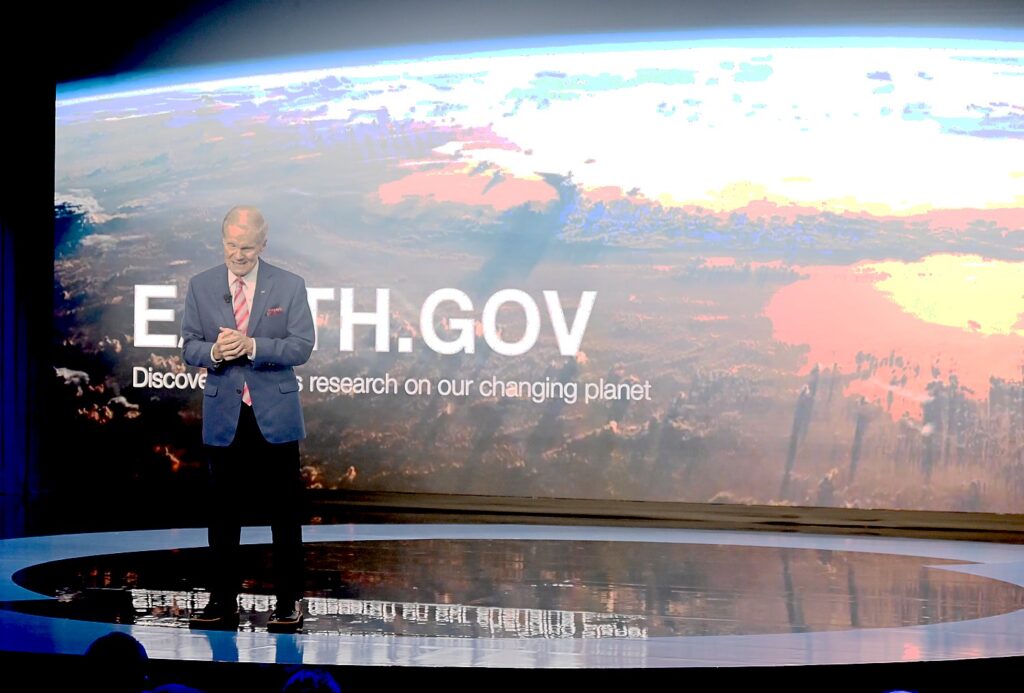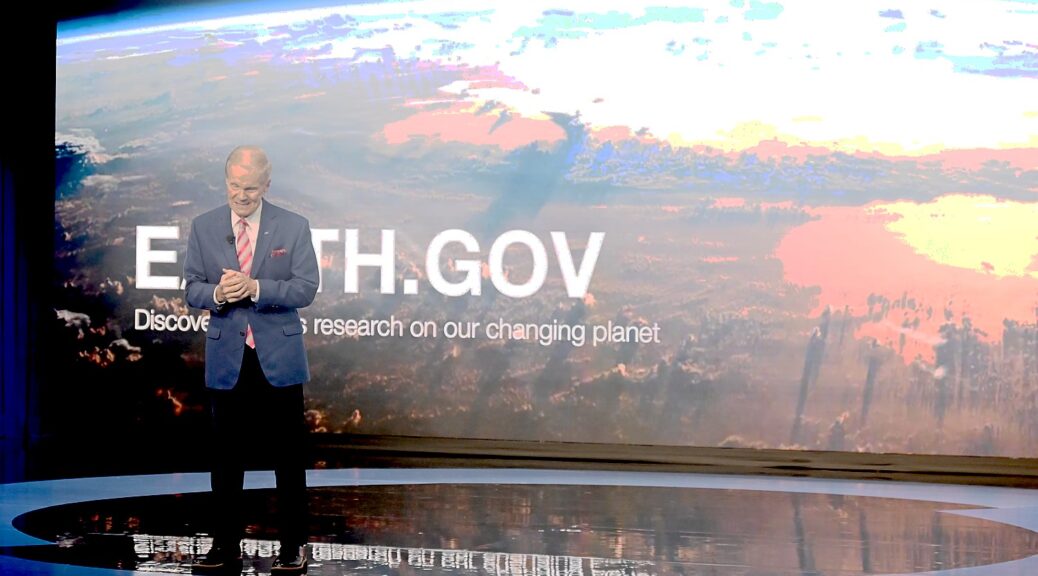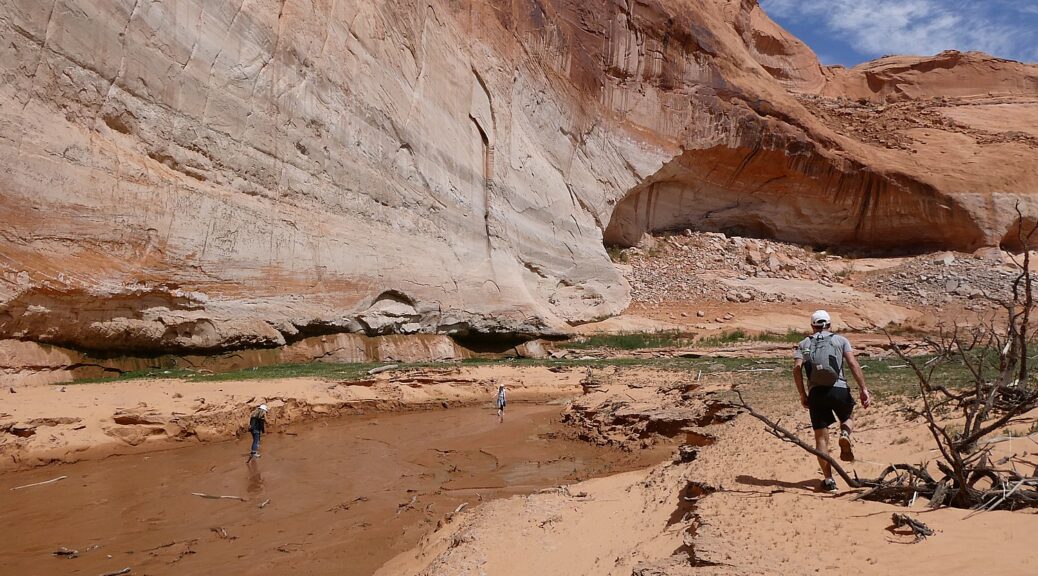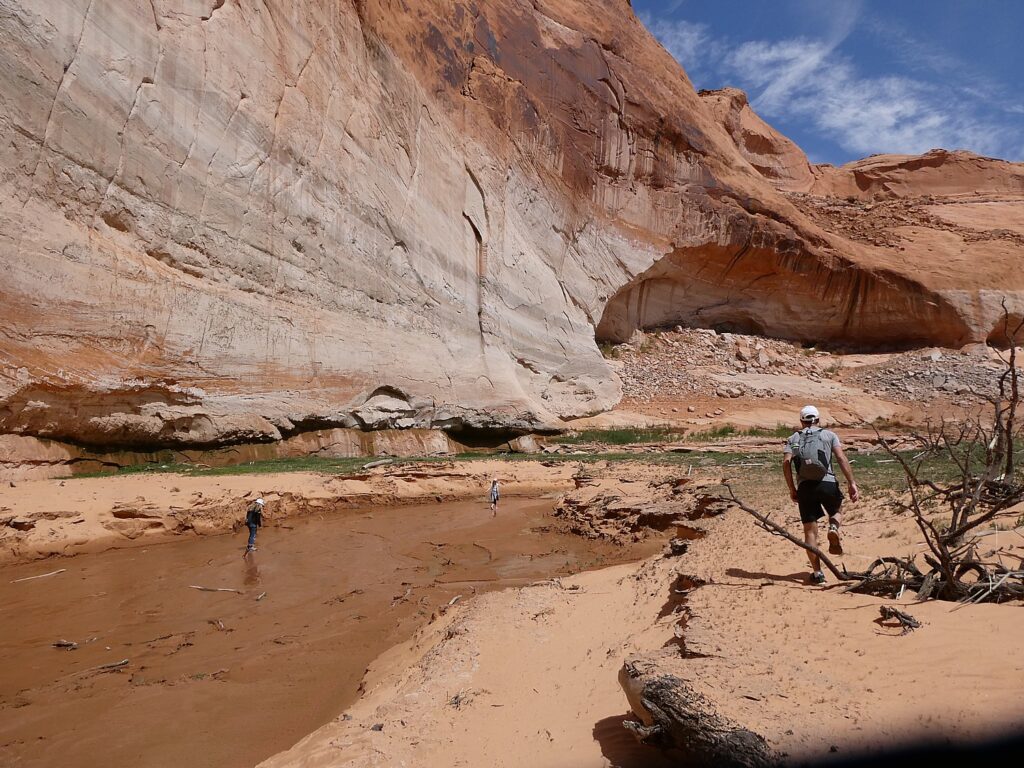
During Climate Week, President Biden delivered remarks highlighting his climate, conservation, clean energy, and environmental justice agenda, which is lowering costs, creating good-paying and union jobs, and reducing harmful emissions.
As the latest historic hurricane event pummels the Southeast, Republican presidential candidate Donald Trump, who routinely calls Climate Change a hoax, promises to “drill baby drill” and pulled the US out of the Paris Climate Agreement, and Republican governors in Florida, Texas, South Carolina deal with climate change by outlawing the term, House Republicans continue reckless attempts to roll back climate, conservation, and clean energy investments – even proposing to shut down NOAA, which gives warnings of weather events.
This fact sheet reviewing President Biden’s historic climate legacy was provided by the White House:
When President Biden took office, he pledged to restore America’s climate leadership at home and abroad. Every day since, the Biden-Harris Administration has led and delivered on the most ambitious climate, conservation, clean energy, and environmental justice agenda in history, including securing the largest ever climate investment and unleashing a clean energy manufacturing boom that has attracted hundreds of billions of dollars in private sector investment; created hundreds of thousands of new clean energy jobs; and lowered energy costs for families while delivering cleaner air and water for communities across the country.
As business leaders, government officials, young people, and other advocates from around the world gather in New York City to participate in Climate Week, tomorrow President Biden delivered remarks in New York City highlighting his Administration’s unprecedented progress in tackling the climate crisis, cutting energy costs for everyday Americans, and creating good-paying union jobs.
Meanwhile, as President Biden and Vice President Harris continue to implement their Investing in America agenda, many Congressional Republicans continue to deny the impacts of climate change and are actively working to roll back this Administration’s historic and urgent climate investments – in fact, House Republicans have voted more than 50 times to repeal parts of President Biden’s climate investments. The contrast couldn’t be clearer.
From replacing toxic lead pipes and modernizing our electric grid to reducing air pollution and conserving our nation’s lands and waters, President Biden and Vice President Harris have positioned America to lead the global effort against climate change and protect the health, safety, and economic vitality of our communities and our environment for generations to come.
Biden-Harris Administration’s Top Climate Accomplishments
Deploying Clean, Affordable Electricity and Strengthening America’s Power Grid
Through the Inflation Reduction Act and Bipartisan Infrastructure Law, President Biden has secured unprecedented investments in a clean power sector, unleashing a boom in American solar, wind, battery storage, nuclear, and other clean energy technologies that are creating good-paying jobs and saving families money on utility bills. President Biden’s Investing in America agenda is supporting the U.S. offshore wind industry, transmission buildout and other power grid upgrades, residential solar for low-income households, investments in clean electricity across rural America, efficient permitting to get new projects built, and American manufacturing of clean energy technologies. Since the start of the Biden-Harris Administration, the US has added more than 100 gigawatts of new clean energy – enough to power more than 25 million homes. Thanks to the Inflation Reduction Act, clean energy project developers get access to expanded tax incentives if they pay workers prevailing wages and employ registered apprentices, build their projects with domestic content, or locate projects in historic energy communities—provisions that are helping make more clean energy jobs good-paying and union jobs, supporting American manufacturing, and driving clean energy investment to the places that can benefit the most.
Bolstering Climate Resilience and Adaptation
The Biden-Harris Administration is taking a whole-of-government approach to addressing climate impacts, including through Federal climate adaptation planning and integrating consideration of climate impacts into Federal policies, programs, and funding. The Administration released a National Climate Resilience Framework and President Biden secured more than $50 billion for climate resilience and adaptation investments that are upgrading aging roads and bridges, including critical evacuation routes; restoring critical waterways, forests, and urban greenspaces; building forest health and reducing wildfire risk; bolstering water infrastructure and drought resilience across the American West; reducing the risk to federal assets from future floods; and modernizing our electric grid. Through portals like Climate Mapping for Resilience and Adaptation (CMRA) and Heat.gov, the Administration is equipping communities with the information and resources they need to assess climate risks and implement adaptation actions in their communities. With historic investments from the President’s Investing in America agenda, the Administration stabilized the short-term security of the Colorado River and is making investments to ensure the long-term stability of the Colorado River Basin.
Accelerating a Clean Transportation Future
Last year, the Biden-Harris Administration released the National Blueprint for Transportation Decarbonization, a landmark strategy for eliminating nearly all greenhouse gas emissions from the U.S. transportation sector by 2050. The Administration’s Bipartisan Infrastructure Law and Inflation Reduction Act invest tens of billions to decarbonize maritime, trucking, transit, rail, and aviation, all while making communities more walkable, bikeable, and connected. The Bipartisan Infrastructure Law is also investing $7.5 billion to build a nationwide network of convenient, reliable electric vehicle (EV) charging infrastructure along corridors and within communities, and $5 billion to put clean school buses on our roads. In addition, the President rallied automakers and autoworkers around a historic goal of having electric vehicles account for at least 50% of new passenger vehicles sold by 2030. To support this goal while driving down consumer costs, the Administration secured tax credits that reduce the cost of new or used clean vehicles by thousands of dollars directly at the dealership as well as tax credits to deploy EV charging and alternative fueling infrastructure to support clean vehicle deployment needs for individuals and businesses within rural and low income communities. The Administration is also leading by example to electrify the federal vehicle fleet, including 66,000 U.S. Postal Service delivery vehicles over five years.
Cutting Energy Costs and Pollution at Homes, Schools, and in Communities
Last year, 3.4 million American families saved $8.4 billion from IRA home energy tax credits for heat pumps, insulation, solar, and other clean energy technologies, and today states across the US are rolling out IRA rebates of up to $14,000 per household to help low- and middle-income families afford cost-saving electric appliances and energy efficiency improvements. The President established a $20 billion national clean energy financing network that will support tens of thousands of clean energy projects and cost-saving retrofits, reducing or avoiding up to 40 million metric tons of carbon pollution annually over the next seven years. The Biden-Harris Administration has also strengthened energy efficiency standards to save households and businesses money, with standards updated by DOE for dozens of appliances expected to provide nearly $1 trillion in consumer savings over 30 years, saving the average household more than $100 a year while also reducing greenhouse gas emissions by more than 2 billion metric tons. Schools across the country are using IRA clean energy tax credits and elective pay to install solar, energy storage, and ground source heat pumps.
Revitalizing American Manufacturing for the Clean Economy
President Biden’s Investing in America agenda has helped catalyze historic manufacturing growth, with factories opening across the nation. The private sector has committed over $910 billion in investments in American manufacturing and clean energy, including sectors central to our industrial strength. The President’s agenda is helping to make U.S. manufacturing the cleanest and most competitive in the world. The Inflation Reduction Act is investing more than $6 billion to slash climate pollution and support workers and community health at U.S. factories producing the steel, aluminum, cement, and other materials that form the backbone of our economy, nearly $2 billion to support shuttered or at-risk auto facilities retain or re-hire workers to support manufacturing in the electric vehicle supply chain, over $3 billion to bolster battery manufacturing, and over $4 billion through the Federal Buy Clean Initiative to bolster markets to buy cleaner materials. The Biden-Harris Administration’s historic steps to reduce super-polluting methane and hydrofluorocarbons are also harnessing American innovation and creating good-paying union jobs.
Advancing Environmental Justice
Since Day One, the Biden-Harris Administration has prioritized a whole-of-government approach to environmental justice. The President signed a historic Executive Order that mobilizes the federal government to bring clean energy and healthy environments to all and mitigate harm to those who have suffered from pollution and environmental burdens like climate change. Through the Justice40 Initiative, over 500 programs across 19 federal agencies are being reimagined and transformed to maximize the benefits of President Biden’s unprecedented investments – from clean energy projects to floodwater protections to wastewater infrastructure – to communities that need them most. At the same time, the Administration is taking unprecedented action to protect communities from PFAS pollution, accelerate Superfund and brownfield cleanups, tighten standards for hazardous air pollutants, and enhance air quality enforcement. To ensure the voices, perspectives, and lived experiences of communities with environmental justice concerns are heard in the White House and reflected in federal priorities, policies, investments, and decision-making, President Biden also created the White House Environmental Justice Advisory Council.
Delivering Clean Water and Replacing Lead Pipes
President Biden and Vice President Harris are fighting to ensure a future where every American has access to clean, safe water. The President’s Bipartisan Infrastructure Law invests over $50 billion in upgrading the nation’s water infrastructure – the largest investment in clean water in American history. The Administration has already launched over 1,700 projects to expand access to clean drinking water, replace lead pipes, improve wastewater and sanitation infrastructure, and remove PFAS pollution in water. The Biden-Harris Administration invested over $1 billion from the President’s Investing in America agenda to specifically accelerate the delivery of drinking water and community sanitation infrastructure projects in Indian Country, where almost 50% of communities are lacking this basic human right. President Biden has also made a commitment to replace every toxic lead pipe in the country within a decade, protecting families from lead poisoning that can irreversibly harm brain development in children.
Empowering Every Community to Advance Climate Solutions
The historic set of federal actions that the Biden-Harris Administration has taken are supporting communities across the country in seizing opportunities in the clean energy economy. The Administration has mobilized billions of dollars in investment in the energy communities and workers that have powered our nation for generations. To help young people access skills-based training for good-paying careers in the clean energy and climate resilience economy, the Administration launched the American Climate Corps, which will mobilize a new, diverse generation of more than 20,000 Americans. And with direct support from the Administration’s Investing in America Agenda, more than 45 states and more than 200 Tribes, territories, and metro areas have now developed their own Climate Action Plans. All of these foundational efforts will support climate solutions in the near-term and for years to come, helping the nation achieve the goal of reducing climate pollution by 50-52% below 2005 levels in 2030 and reaching a net-zero economy by no later than 2050.
Conserving our Lands and Waters
President Biden’s America the Beautiful initiative is supporting and accelerating voluntary, locally led conservation and restoration efforts across the country, and with 42 million acres already protected under President Biden, the U.S. is on track to meet the first-ever national goal to conserve at least 30 percent of our lands and waters by 2030. The Biden-Harris Administration has established or expanded eight national monuments and restored protections for three more; created five new national wildlife refuges and significantly expanded five more; established two new national marine sanctuaries and begun the process to designate or expand protections for five more; created one new national estuarine research reserve; protected the Boundary Waters of Minnesota, the nation’s most visited wilderness area; safeguarded Bristol Bay in southwest Alaska from the impacts of mining; protected the Arctic Ocean from oil and gas development; and withdrawn Chaco Canyon in New Mexico and Thompson Divide in Colorado from further oil and gas leasing which will protect pristine lands and thousands of sacred sites. The Administration also directed the conservation of old-growth and mature forests, put conservation on equal footing with development in managing our public lands, launched the America the Beautiful Freshwater Challenge to protect, restore, and reconnect 8 million acres of wetlands and 100,000 miles of our nation’s river and streams, protected vast areas of caribou habitat in the Western Arctic for future generations, and is advancing the Chumash Heritage National Marine Sanctuary off the coast of California.
Rallying Leaders of the World’s Largest Economies to Raise Global Climate Ambition
President Biden has restored America’s climate leadership at home and abroad. Under his leadership, the Administration is securing commitments from more than 155 countries to reduce methane emissions by at least 30 percent by 2030; successfully galvanizing other countries at COP28 to commit, for the first time, to transition away from unabated fossil fuels, stop building new unabated coal capacity globally, and triple renewable energy globally by 2030 and nuclear energy by 2050; launching a new Clean Energy Supply Chain Collaborative to work with international partners to diversify supply chains that are critical to a clean and secure energy transition; mobilizing other governments to follow the U.S. lead and commit to achieve net-zero government emissions by 2050 through a new Net-Zero Government Initiative; and becoming a world leader in innovative debt-for-nature swaps that have helped countries restructure over $2 billion in debt and unlock hundreds of millions of new financing for nature and climate.
Accelerating Federal Permitting to Deliver Clean Energy and Infrastructure More Quickly
The Biden-Harris Administration has taken action to accelerate clean energy infrastructure and deliver other critical projects by securing and directing long overdue resources to improve and accelerate permitting and environmental reviews. The Administration also finalized the Bipartisan Permitting Reform Implementation Rule to address climate change, protect public health, encourage better environmental outcomes, and promote meaningful public input on Federal decisions and projects.
House Republicans Continue Attempting to Roll Back Climate Protections
As President Biden and Vice President Harris implement the most ambitious and impactful climate and conservation agenda in history, House Republicans are taking action right now that would roll back investments in climate, clean energy, and public health. House Republicans’ efforts to gut climate protections through a variety of avenues – including appropriations bills, Congressional Review Act resolutions, and other legislative actions – would raise consumer energy costs, undermine public health protections, worsen the impacts of extreme weather events, and destroy environmental safeguards for our lands and waters.
Ongoing attempts by Congressional Republicans to roll back climate and environmental protections would:
Raise Consumer Energy Costs, including by:
- Attempting to eliminate funding for the development of U.S. manufacturing capabilities in vehicles, trains and locomotives, maritime vessels including offshore wind support vessels, and aircraft.
- Threatening to limit or eliminate tax credits and rebates for families, including for energy saving home improvements and appliance upgrades and tax credits for home efficiency projects, rooftop solar panel installation, new and used electric vehicle purchases, and more.
- Blocking progress on programs that support residential solar projects to reduce utility bills in low-income and disadvantaged communities, and clean energy tax credits that deliver economic benefits from new projects and factories in communities across the country.
- Taking steps to undermine clean vehicle deployment by eliminating guidance implementing tax credits for new and used clean vehicles.
- Targeting commonsense energy efficiency standards for appliances that are expected to deliver $1 trillion in consumer savings over 30 years
Gut Public Health Protections, including by:
- Trying to overturn Biden-Harris Administration rules that protect communities from coal plants’ water pollution, air pollution, and waste disposal.
- Trying to overturn a Biden-Harris Administration rule that will reduce by 96% the number of people with elevated cancer risk near certain chemical plants, by reducing emissions of toxic chloroprene and ethylene oxide from those facilities.
- Rolling back the Clean School Bus program that will reduce climate pollution and provide cleaner air for our nation’s children.
- Undermining clean air progress by trying to overturn rules that reduce pollution from power plants, cars and trucks , and industrial sources.
- Taking steps to block new Biden-Harris Administration rules to protect coal and other miners from toxic silica dust.
Destroy Protections for Our Lands and Waters, including by:
- Trying to eliminate Presidential authority to establish national monuments altogether.
- Working to dismantle President Biden’s America the Beautiful Initiative.
- Threatening to expose cherished landscapes to new drilling, including 13 million acres of special areas in the Western Arctic.
- Planning to reduce accountability for oil and gas companies.





